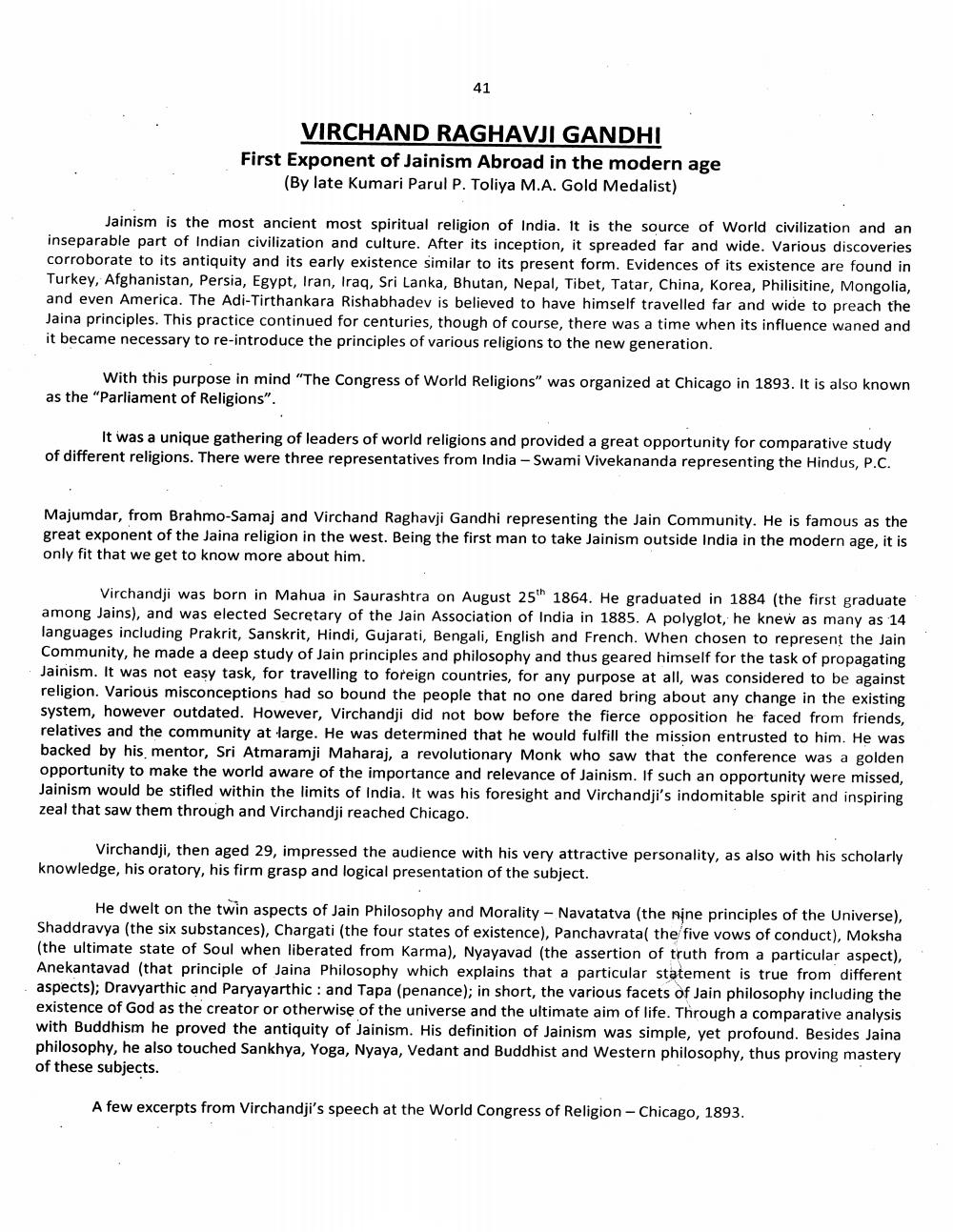________________
41
VIRCHAND RAGHAVJI GANDHI First Exponent of Jainism Abroad in the modern age
(By late Kumari Parul P. Toliya M.A. Gold Medalist)
Jainism is the most ancient most spiritual religion of India. It is the source of World civilization and an inseparable part of Indian civilization and culture. After its inception, it spreaded far and wide. Various discoveries corroborate to its antiquity and its early existence similar to its present form. Evidences of its existence are found in Turkey, Afghanistan, Persia, Egypt, Iran, Iraq, Sri Lanka, Bhutan, Nepal, Tibet, Tatar, China, Korea, Philisitine, Mongolia, and even America. The Adi-Tirthankara Rishabhadev is believed to have himself travelled far and wide to preach the Jaina principles. This practice continued for centuries, though of course, there was a time when its influence waned and it became necessary to re-introduce the principles of various religions to the new generation.
With this purpose in mind "The Congress of World Religions" was organized at Chicago in 1893. It is also known as the "Parliament of Religions".
It was a unique gathering of leaders of world religions and provided a great opportunity for comparative study of different religions. There were three representatives from India - Swami Vivekananda representing the Hindus, P.C.
Majumdar, from Brahmo-Samaj and Virchand Raghavji Gandhi representing the Jain Community. He is famous as the great exponent of the Jaina religion in the west. Being the first man to take Jainism outside India in the modern age, it is only fit that we get to know more about him.
Virchandji was born in Mahua in Saurashtra on August 25th 1864. He graduated in 1884 (the first graduate among Jains), and was elected Secretary of the Jain Association of India in 1885. A polyglot, he knew as many as 14 languages including Prakrit, Sanskrit, Hindi, Gujarati, Bengali, English and French. When chosen to represent the Jain Community, he made a deep study of Jain principles and philosophy and thus geared himself for the task of propagating Jainism. It was not easy task, for travelling to foreign countries, for any purpose at all, was considered to be against religion. Various misconceptions had so bound the people that no one dared bring about any change in the existing system, however outdated. However, Virchandji did not bow before the fierce opposition he faced from friends, relatives and the community at large. He was determined that he would fulfill the mission entrusted to him. He was backed by his mentor, Sri Atmaramji Maharaj, a revolutionary Monk who saw that the conference was a golden opportunity to make the world aware of the importance and relevance of Jainism. If such an opportunity were missed, Jainism would be stifled within the limits of India. It was his foresight and Virchandji's indomitable spirit and inspiring zeal that saw them through and Virchandji reached Chicago.
Virchandji, then aged 29, impressed the audience with his very attractive personality, as also with his scholarly knowledge, his oratory, his firm grasp and logical presentation of the subject.
He dwelt on the twin aspects of Jain Philosophy and Morality - Navatatva (the nine principles of the Universe), Shaddravya (the six substances), Chargati (the four states of existence), Panchavrata( the five vows of conduct), Moksha (the ultimate state of Soul when liberated from Karma), Nyayavad (the assertion of truth from a particular aspect), Anekantavad (that principle of Jaina Philosophy which explains that a particular statement is true from different aspects); Dravyarthic and Paryayarthic: and Tapa (penance); in short, the various facets of Jain philosophy including the existence of God as the creator or otherwise of the universe and the ultimate aim of life. Through a comparative analysis with Buddhism he proved the antiquity of Jainism. His definition of Jainism was simple, yet profound. Besides Jaina philosophy, he also touched Sankhya, Yoga, Nyaya, Vedant and Buddhist and Western philosophy, thus proving mastery of these subjects.
A few excerpts from Virchandji's speech at the World Congress of Religion - Chicago, 1893.




